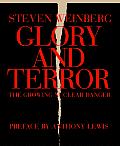
| ABOUT DV | CONTACT | SUBMISSIONS |
The Lust for Glory Can Only Lead to
Destruction
by Michael Payne
www.dissidentvoice.org
December 6, 2004
![]()
Steven Weinberg, Glory and Terror: The Growing Nuclear Danger, with a Preface by Anthony Lewis (New York Review of Books, 2004).
This
book by the Nobel Prize physicist Steven Weinberg is the second in a series
of edited and up-dated reprints of essays that originally appeared in "The
New York Review of Books." This thoughtful and eloquent text is an important
contribution to the assessment of U.S. foreign policy in an election year,
to our historical position as an advocate of the non-proliferation of
nuclear weapons, and to an understanding of how the current administration
is disastrously mishandling the unique position of this country as the last
superpower.
Weinberg writes with remarkable clarity about scientific and political issues that too often have been obscured by a fog of technical jargon. He also writes with ethical passion and a historical perspective that puts our current "lust for glory" in a context that reaches back to ancient times. Because it is so rare in contemporary debate, his combination of technical expertise, moral commitment, and historical understanding gives his arguments a persuasive authority.
The heart of Weinberg's argument is this: During the last half-century since nuclear weapons were used by the U.S. in war, "there has developed a healthy conviction that these weapons should not be used again for anything but deterrence." Thus in 1970 a number of countries reached the remarkable agreement (the Nuclear Non-Proliferation Treaty) that they would not develop nuclear weapons at all in exchange for the pledge by the U.S. and the other nuclear powers that they would work toward the elimination of all nuclear weapons. But now the Bush administration "has turned its back on the non-Proliferation Treaty by calling for work on a new generation of low-yield nuclear weapons. This would add nothing to our nuclear deterrent, but might actually be used in fighting wars."
Weinberg begins his book with some simple but startling facts about the U.S. nuclear arsenal that is left over from the cold war. That arsenal includes 6,000 operationally deployed nuclear weapons. (Here "operationally deployed" refers to nuclear warheads that are installed on missiles ready to be fired or to bombs that are set to be loaded on service bombers.) Those weapons fall into three categories: 2,000 are on intercontinental ballistic missiles, 3,500 are on submarine-launched ballistic missiles, and the rest are carried by bomber aircraft. Each of these thermonuclear weapons is far more powerful than the fission bombs that were used to destroy Hiroshima and Nagasaki.
Two years ago Presidents Bush and Putin signed a treaty that calls for a reduction in operationally deployed U.S. and Russian nuclear weapons to about 4,000 (but not until 2007) and to about 2,000 by (but not until 2012). President Bush, moreover, has claimed with unusual candor that the purpose of the Bush-Putin treaty is not to "liquidate the legacy of the cold war." Indeed, its purpose seems to be to retain as much of that legacy as possible. So what are these weapons for? Weinberg asks. Because the scale of our arsenal would have no relevance in a preemptive strike against any other power, the only conceivable answer is that the American nuclear arsenal exists "to launch a preemptive attack against Russian strategic weapons."
Echoing Clausewitz, Weinberg asserts that "War offers ample opportunities for most varieties of foolishness." Clausewitz, writing in 1832, thought this was the case because war "has no definite limits in any direction," which causes it continuously to spill out beyond the bounds of reason and theory. Weinberg has another explanation, which is quite simply "the lust for glory." Signs of that lust include a commander's "readiness to accept a challenge to fight under unfavorable circumstances; a preference for taking action independent of allies or colleagues; an unreasoning predisposition for offence rather than defense; and an effort to seize a decisive role in winning victory." The examples of the lust for glory that Weinberg cites include Antony's acceptance of Agrippa's challenge to fight by sea at Actium when Antony was stronger by land and the Duke of Clarence's rush in 1421 to attack 5,000 French troops with 150 mounted men-at-arms and no archers.
Nevertheless, Weinberg's historical allegory is quite transparent. What he sees in the war in Iraq and in Bush's abandonment of the Nuclear Non-proliferation Treaty are the unmistakable signs of the lust for glory, which he is certain is leading to a growing nuclear danger of our own making. As his title suggests, glory and terror are a horrendous combination.
Michael Payne is John P. Crozer Professor of English at Bucknell
University, where he teaches and writes about literature and critical
theory.
